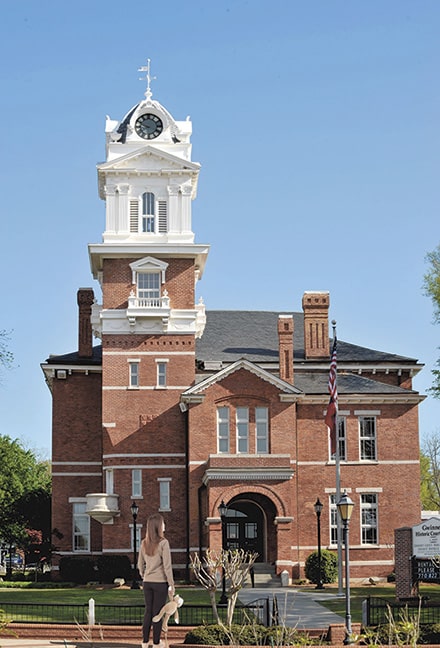Georgia state senator Renee Unterman is on a mission, one that began almost 10 years ago. That mission should have ended within a few months of its beginning, yet it has become a decade-long battle, with the end only now in sight.
The mission? The enactment of legislation that properly and forcefully addresses child sex trafficking.
The term “sex trafficking” has a deceptively innocuous ring to it, which is sometimes taken as an indication that it’s not a particularly serious crime. Nothing could be further from the truth. Sex trafficking, particularly when a child is involved, is a crime with life-taking consequence.
The sex trafficking of children may not end with death, but it takes the childhood life of victims as young as 10 years old. If that statement seems to be one of exaggeration, consider the childhood of a 10-year old girl submitting to sexual intercourse with sweating, grunting men old enough to be her father or grandfather. Again, again and again. And consider that once a girl is rescued from such an existence, it will be years before the scars, some physical, some emotional, heal. Some never will.
In spite of the life-stealing tragedy of child sex trafficking, Senator Unterman’s mission has been met with considerable resistance. In some quarters, her legislative proposals were considered too lenient; in others, they were deemed too extreme. The latter viewpoint is unfathomable. Is any length of prison time or monetary penalty too severe for stealing a person’s childhood?
The Federal Trafficking Victims Protection Act (which also applies to adults) defines the crime of human trafficking under two categories, sex trafficking and labor trafficking. Sex trafficking is defined as:
“The recruitment, harboring, transportation, provision, or obtaining of a person for the purpose of a sex act where such an act is induced by force, fraud, or coercion, or in which the person induced to perform such act has not attained 18 years of age.”
Labor trafficking is defined as:
“The recruitment, harboring, transportation, provision, or obtaining of a person for labor or services, through the use of force, fraud, or coercion for the purposes of subjection to involuntary servitude, peonage, debt bondage, or slavery.”
Although this section does not specifically address sexual exploitation, it would apply to a person of any age being forced to provide any type of service.
But in the dark, putrid world of child sex trafficking, federal laws can amount to little more than flashlights and a few squirts of air freshener. Federal law enforcement frequently doesn’t have sufficient presence or personnel to be widely effective across 50 states and thousands of local jurisdictions.
Consequently, Senator Unterman has battled, year after year, to pass the state legislation necessary to empower Georgia state and local law enforcement with the legal tools needed to effectively fight child sex trafficking and exploitation. These laws not only establish the criminal parameters of child sex-related activities, but require certain people to report suspected child exploitation should they have reasonable suspicion that it has occurred. This requirement applies to people in a wide range of professions including medical personnel, (physicians, physicians assistants, psychologists, dentists, nurses and hospital employees) teachers, school administrators, law enforcement personnel and child service personnel.
Child sex trafficking is typically referred to as CSEC (Commercial Sexual Exploitation Of Children) or DMST (Domestic Minor Sex Trafficking). Irrespective of the term used, it refers to criminal activity in which children 17 and younger are sexually exploited by a third party who financially benefits from a child’s participation in sexual acts.
As if being forced into prostitution isn’t life-damaging enough, exploited children (and adults) were formerly processed through the criminal justice system after being taken into custody by law enforcement. The end result was that the price for being liberated from forced prostitution was a criminal record.
That changed with new laws passed n 2011. Oddly enough, getting that legislation passed was a fight because, as absurd as it may seem, many people believed (or stated they believed) that children made the choice to become prostitutes. Senator Unterman’s question puts the absurdity of such a belief in perspective. “What 10-year old thinks, I want to be a prostitute?”
Fortunately, sexually exploited children (and adults) are now treated as victims and receive care and assistance instead of a criminal record. Georgia Cares, (www.georgiacares.org) is an independent, non-profit organization that is on hand to help child sex trafficking victims throughout the state. The Georgia Cares web site states, “Georgia Cares is the single, statewide coordinating agency connecting services and treatment care for victims. Through research informed practices and evidence based assessments, the organization coordinates services to meet all needs and dimensions of a child’s wellbeing. Staff follow a victim throughout their process of treatment and recovery to lead healthy, successful lives as productive members of society.”
Residents of upscale suburban neighborhoods may take exception to the need for Georgia Cares services “throughout the state”. Surely, child sex trafficking activity is confined to inner cities, particularly the low-income areas. That assumption is patently false. Child sex trafficking is about money, so pimps seek out high income customers.
Don’t think your neighbor could be a pimp? Think again. In March of this year, eight women who had been held against their will were freed from a $950,000+ house in Sandy Springs. The man holding them captive has been charged with false imprisonment and trafficking of persons for labor. In this case, the women weren’t children, but that’s not always the case. In 2015, a nationwide sex trafficking investigation conducted by the FBI rescued 149 underage victims, seven of whom were from Georgia. The investigation also led to the arrest of nine Georgia residents who were charged with being pimps.
In Part Two, the on-going battle for stronger anti-sex trafficking laws, and a look at the real-life experiences of children who were sexually exploited.


